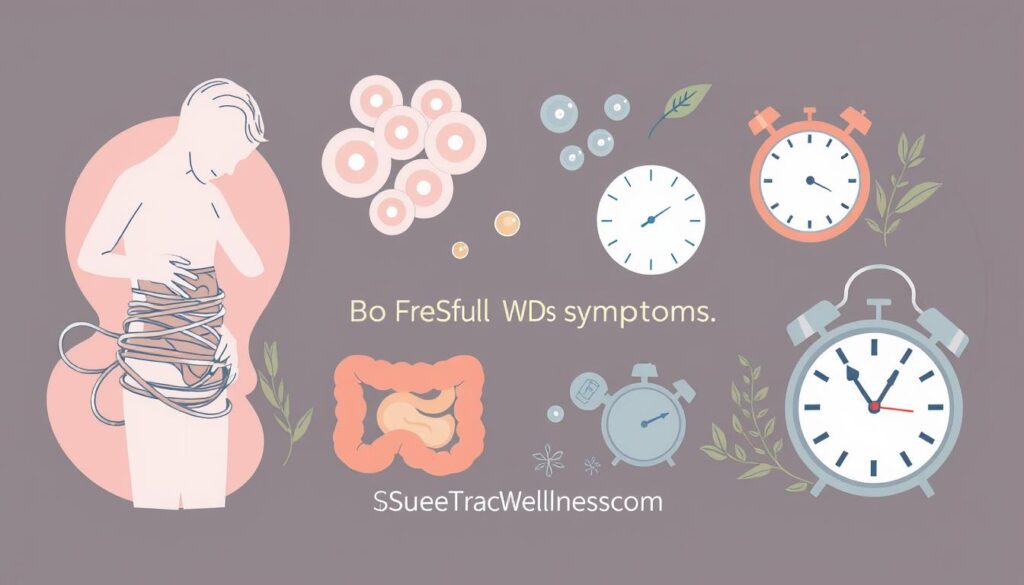The human gut, home to a vast and complex ecosystem of microorganisms, plays a pivotal role in our overall health and wellbeing. When this delicate balance is disrupted, it can lead to a host of digestive issues, including the all-too-common Irritable Bowel Syndrome (IBS) and other gastrointestinal troubles. Fortunately, a growing body of research suggests that by embracing natural remedies and adopting a holistic approach to gut health, individuals can find relief and restore their digestive harmony.
In this comprehensive guide, we will explore the intricacies of gut health, delve into the various natural remedies that can alleviate IBS and other digestive woes, and uncover the powerful connection between the gut and overall well-being. From the importance of the gut microbiome to the role of probiotics, this article will equip you with the knowledge and tools to take control of your digestive health and embark on a journey towards optimal wellness.
Key Takeaways
- Gut health is crucial for overall well-being, impacting various aspects of physical and mental health.
- Natural remedies, such as dietary changes and herbal supplements, can effectively manage IBS and other digestive disorders.
- Probiotics play a vital role in maintaining a healthy gut microbiome, supporting digestion and immune function.
- Stress management and lifestyle modifications can significantly improve gut health and alleviate digestive symptoms.
- Consulting healthcare professionals can provide personalized guidance and a comprehensive approach to addressing gut-related issues.
What is Gut Health and Why It Matters?
Gut health is a critical aspect of overall well-being that often goes overlooked. At its core, gut health refers to the delicate balance of the gut microbiome, the diverse community of microorganisms that reside in our digestive system. This intricate ecosystem plays a vital role in numerous bodily functions, from nutrient absorption and digestion to immune system regulation and even mental health.
Definition and Importance of Gut Health
A healthy gut is one that harbors a thriving, diverse gut microbiome. This microbiome is composed of trillions of bacteria, viruses, and other microorganisms that work together to support various aspects of our health. When this balance is disrupted, it can lead to a host of issues, from digestive problems to chronic inflammation and even mental health concerns.
The Gut-Brain Connection
The gut-brain connection is a fascinating phenomenon that highlights the profound influence of gut health on our overall well-being. The gut and the brain are intimately connected through the gut-brain axis, a complex communication network that allows the gut to send signals to the brain and vice versa. This connection means that the health of our gut can directly impact our mood, cognitive function, and even our susceptibility to stress.
Impact on Overall Well-being
A healthy gut microbiome is essential for maintaining overall well-being. When the gut is out of balance, it can trigger a domino effect, leading to a range of issues such as digestive enzymes imbalances, nutrient deficiencies, and even stress management difficulties. Conversely, a thriving gut microbiome can support a strong immune system, aid in weight management, and even contribute to better mental health.
Understanding the importance of gut health is the first step towards optimizing your overall well-being. By nurturing a healthy gut microbiome, you can unlock a world of benefits that extend far beyond just your digestive system.
Common Digestive Disorders
Maintaining a healthy gut is crucial for overall well-being, but many individuals struggle with various digestive issues that can impact their quality of life. From the well-known Irritable Bowel Syndrome (IBS) to other common digestive disorders, understanding these conditions and their symptoms is the first step towards finding relief and improving gut health.
Overview of IBS (Irritable Bowel Syndrome)
IBS is a chronic gastrointestinal disorder that affects the large intestine, causing a range of symptoms such as abdominal pain, bloating, constipation, and/or diarrhea. While the exact cause of IBS is not fully understood, it is believed to be related to a combination of factors, including muscle contractions in the intestine, sensitivity to certain foods, and stress.
Other Digestive Issues Affecting Gut Health
In addition to IBS, there are several other digestive disorders that can impact gut health, including:
- Crohn’s disease: An inflammatory bowel disease that can cause inflammation and damage to any part of the digestive tract
- Ulcerative colitis: Another type of inflammatory bowel disease that primarily affects the colon and rectum
- Gastroesophageal Reflux Disease (GERD): A condition where stomach acid flows back into the esophagus, causing heartburn and other symptoms
- Diverticulitis: The inflammation or infection of small pouches that can form in the digestive tract
Signs and Symptoms to Watch For
Regardless of the specific digestive disorder, there are several common signs and symptoms to be aware of, including:
- Persistent abdominal pain or discomfort
- Changes in bowel movements (diarrhea, constipation, or alternating between the two)
- Bloating and excessive gas
- Nausea and/or vomiting
- Unexplained weight loss
- Blood in the stool
If you experience any of these symptoms, it’s important to consult with a healthcare professional to identify the underlying cause and develop an appropriate treatment plan to address your IBS, digestive woes, and overall gut health.

Natural Remedies for Improving Gut Health
Maintaining a healthy gut is crucial for overall well-being, and fortunately, there are natural approaches that can help improve digestive function. From the importance of fiber-rich foods to the role of probiotics, let’s explore effective strategies to nourish your gut and alleviate common digestive woes.
The Significance of Fiber
Fiber is a vital component of a healthy gut. It helps regulate bowel movements, promotes the growth of beneficial gut bacteria, and can even reduce the risk of IBS (Irritable Bowel Syndrome). Incorporating a variety of fiber-rich foods, such as whole grains, legumes, fruits, and vegetables, can make a significant difference in your digestive well-being.
Probiotics and Prebiotics
Probiotics are live bacteria and yeasts that are beneficial for your digestive system. They can help restore the balance of good bacteria in your gut, aiding in the prevention and management of various digestive issues. Prebiotics, on the other hand, are the food that probiotics thrive on, further supporting a healthy gut microbiome. Incorporating probiotic-rich foods like yogurt, kefir, and fermented vegetables, as well as prebiotic-rich foods like bananas, onions, and garlic, can be a game-changer for your gut health.
“Maintaining a healthy gut is the foundation for overall well-being. Natural remedies, like a fiber-rich diet and probiotic supplements, can work wonders in restoring digestive balance.”
By embracing these natural approaches, you can take proactive steps to support your gut health and alleviate common digestive problems. Remember, small changes can make a big difference in how you feel and function, so start incorporating these natural remedies into your daily routine today.
Herbal Remedies for IBS Relief
When it comes to managing the frustrating symptoms of Irritable Bowel Syndrome (IBS), many individuals are turning to natural, herbal remedies for relief. These time-tested botanical solutions offer a gentle, yet effective approach to soothing digestive discomfort and promoting overall gut health.
Peppermint Oil and Its Benefits
One of the most widely recognized herbal remedies for IBS is peppermint oil. This cooling essential oil has been shown to possess antispasmodic properties, helping to relax the smooth muscles of the intestines and alleviate abdominal cramps and bloating. Numerous studies have demonstrated the efficacy of peppermint oil in managing the symptoms of IBS, making it a popular choice for those seeking a natural alternative to conventional medications.
Ginger: A Natural Anti-inflammatory
Another herbal powerhouse for IBS relief is ginger. This versatile root is known for its potent anti-inflammatory effects, which can be particularly beneficial for individuals experiencing gut inflammation and discomfort. Ginger has been shown to help reduce the production of inflammatory compounds, while also enhancing digestive function and soothing the gastrointestinal tract.
Chamomile Tea for Soothing Symptoms
In addition to peppermint oil and ginger, chamomile tea is another natural remedy that can provide relief for those suffering from IBS. Chamomile is renowned for its calming properties, both physically and mentally. Drinking a warm cup of chamomile tea can help to soothe the digestive system, reduce inflammation, and promote relaxation – all of which can be helpful in managing the complex symptoms of IBS.
While these herbal remedies offer promising benefits for IBS management, it’s important to consult with a healthcare professional before incorporating them into your routine, especially if you are taking any medications or have other underlying health conditions. With the right approach, however, these natural solutions may provide a gentle, yet effective way to find relief and support overall gut health.

“Herbal remedies can be a valuable tool in the management of IBS, offering a natural and holistic approach to soothing digestive discomfort.”
Dietary Changes to Enhance Gut Health
Maintaining a healthy gut is essential for overall well-being, and making the right dietary choices can have a significant impact. By incorporating an anti-inflammatory diet and fiber-rich foods, you can support your digestive system and alleviate the symptoms of irritable bowel syndrome (IBS).
Foods to Include for Optimal Health
The foundation of a gut-friendly diet lies in whole, unprocessed foods. Focus on incorporating the following items:
- Fiber-rich fruits and vegetables, such as berries, leafy greens, and avocados
- Whole grains, including oats, quinoa, and brown rice
- Fermented foods like yogurt, kefir, and sauerkraut, which are rich in beneficial probiotics
- Nuts and seeds, which provide healthy fats and fiber
- Lean proteins, such as chicken, fish, and legumes
Foods to Avoid for IBS Management
While a balanced diet is essential, certain foods can exacerbate IBS symptoms. It’s best to limit or avoid the following:
- Processed and fried foods, which can be high in unhealthy fats and additives
- Refined carbohydrates, such as white bread and pasta
- Sugary and carbonated drinks, which can disrupt gut function
- Dairy products, if you’re lactose intolerant
- Spicy and highly seasoned foods, which may trigger digestive distress
The Role of Hydration
Proper hydration is crucial for maintaining a healthy gut. Aim to drink plenty of water throughout the day, as it helps to soften stool and promote regular bowel movements. Additionally, consider incorporating herbal teas, such as peppermint or ginger tea, which can provide soothing and anti-inflammatory benefits for your digestive system.

“A balanced, anti-inflammatory diet rich in fiber-rich foods and digestive enzymes can make a significant difference in managing IBS and promoting overall gut health.”
Mindfulness and Stress Management
Stress plays a significant role in our overall well-being, and its impact on digestive health is undeniable. The gut-brain connection is a complex relationship that directly influences our digestive processes. When we experience high levels of stress, our body’s natural stress response can disrupt the delicate balance of our gut, leading to a range of issues such as irritable bowel syndrome (IBS), bloating, and other digestive woes.
Connection Between Stress and Digestive Health
Chronic stress can have a profound effect on the gut microbiome, altering the balance of beneficial bacteria and contributing to inflammation. This, in turn, can trigger a cascade of symptoms, including abdominal pain, diarrhea, constipation, and even changes in appetite. Stress also affects the production of digestive enzymes and the functionality of the gut lining, further exacerbating digestive problems.
Practices to Reduce Stress and Improve Gut Health
Fortunately, there are several effective practices that can help manage stress and promote better gut health. Mindfulness techniques, such as meditation and deep breathing exercises, have been shown to reduce stress and improve overall digestive function. By cultivating a greater sense of present-moment awareness and relaxation, these practices can help calm the mind and body, allowing the gut to function more optimally.
Breathing Techniques and Meditation
Incorporating simple breathing exercises and meditation into your daily routine can make a significant difference in your stress levels and gut health. Diaphragmatic breathing, also known as “belly breathing,” can help activate the parasympathetic nervous system, which is responsible for the “rest and digest” functions of the body. Regular meditation practice has also been linked to reduced inflammation and improved gut microbiome composition.
By prioritizing stress management and incorporating mindfulness-based practices into your lifestyle, you can take proactive steps to support your gut health and overall well-being. Remember, addressing the gut-brain connection is a powerful way to achieve a more balanced and resilient digestive system.

| Mindfulness Practice | Benefits for Gut Health |
|---|---|
| Meditation | Reduces inflammation, improves gut microbiome |
| Diaphragmatic Breathing | Activates the parasympathetic nervous system, promotes relaxation |
| Yoga | Combines physical movement with breath awareness, reduces stress |
Exploring the Role of Fiber
Fiber, a vital component of a healthy diet, plays a crucial role in maintaining a balanced gut microbiome. Understanding the different types of fiber and their benefits can help you optimize your digestive health and enhance your overall well-being.
Types of Fiber and Their Benefits
Fiber comes in two main forms: soluble and insoluble. Soluble fiber dissolves in water, slowing the digestive process and helping to regulate blood sugar levels. It can also help lower cholesterol and promote heart health. Insoluble fiber, on the other hand, does not dissolve in water and helps to add bulk to stool, promoting regular bowel movements and preventing constipation.
Both types of fiber are essential for a healthy gut microbiome, as they feed the beneficial bacteria in your intestines, known as probiotics. Fiber-rich foods can also help reduce inflammation in the digestive system, which is often associated with conditions like irritable bowel syndrome (IBS).
Soluble vs. Insoluble Fiber
While both soluble and insoluble fiber are important, they serve different functions in the body. Soluble fiber helps to slow the absorption of nutrients, which can be beneficial for managing blood sugar levels and keeping you feeling full for longer. Insoluble fiber, on the other hand, helps to add bulk to stool and promote regular bowel movements, making it particularly helpful for those struggling with constipation or other digestive issues.
How to Incorporate More Fiber into Your Diet
- Incorporate fiber-rich foods such as whole grains, fruits, vegetables, legumes, and nuts into your daily meals and snacks.
- Gradually increase your fiber intake to allow your digestive system to adapt, as sudden increases can sometimes lead to gas or bloating.
- Drink plenty of water to help the fiber move through your digestive tract more effectively.
- Consider taking a fiber supplement if you’re struggling to meet your daily fiber needs through diet alone.
By understanding the importance of fiber and incorporating more of it into your diet, you can support a healthy gut microbiome and improve your overall digestive health. Remember to consult with a healthcare professional if you have any ongoing concerns or conditions related to your gut health.

The Importance of Regular Exercise
Maintaining a healthy digestive system is not solely dependent on your diet – regular exercise plays a crucial role as well. Physical activity is a powerful tool in promoting gut health and supporting a thriving gut microbiome. By understanding the benefits of exercise and incorporating it into your routine, you can take proactive steps to improve your overall digestive health and well-being.
How Physical Activity Benefits Digestive Health
Exercise has a direct impact on your gut health. When you engage in physical activity, it stimulates the contractions of the intestinal muscles, promoting the movement of waste through the digestive tract. This, in turn, helps prevent constipation, bloating, and other common digestive issues. Additionally, exercise has been shown to increase the diversity of the gut microbiome, which is essential for maintaining a healthy balance of gut bacteria.
Recommended Exercises for Gut Health
- Brisk walking: A simple yet effective way to get your body moving and support digestive function.
- Yoga: Certain yoga poses, such as forward folds and twists, can help stimulate the digestive system.
- Swimming: Low-impact and gentle on the body, swimming can aid in relieving gastrointestinal discomfort.
- High-intensity interval training (HIIT): Short bursts of intense exercise followed by recovery periods can help reduce inflammation and improve gut health.
Creating a Sustainable Exercise Routine
The key to reaping the benefits of exercise for your digestive health is consistency. Aim to incorporate physical activity into your daily or weekly routine in a way that is sustainable and enjoyable for you. Start with small, manageable steps, such as taking a daily walk or trying a new yoga class. As you build momentum, gradually increase the duration and intensity of your workouts to challenge your body and continue seeing improvements in your gut health.
By prioritizing regular exercise and finding activities that you genuinely enjoy, you can support a healthy digestive system, manage stress, and promote overall well-being. Remember, a balanced approach that combines a nutrient-rich diet, stress management techniques, and an active lifestyle is the recipe for optimal gut health.

Consulting Health Professionals
When persistent digestive woes or unrelenting gut-related issues arise, it’s crucial to seek guidance from healthcare professionals. While natural remedies and lifestyle adjustments can significantly improve gut health, there may be times when a more comprehensive approach is necessary. By consulting with doctors, nutritionists, and dietitians, you can develop an integrative strategy that combines conventional and alternative therapies to address your specific digestive concerns.
When to See a Doctor for Symptoms
If you’re experiencing ongoing symptoms such as chronic abdominal pain, persistent diarrhea or constipation, bloating, or unexplained weight changes, it’s advisable to schedule an appointment with your healthcare provider. They can perform a thorough evaluation, identify the underlying causes, and recommend appropriate treatment options, whether it’s medication, dietary modifications, or a combination approach.
Integrative Approaches to Gut Health
Integrative medicine practitioners, like naturopathic doctors or functional medicine specialists, can provide a holistic perspective on gut health. They may incorporate natural remedies, herbal therapies, and lifestyle interventions alongside conventional medical care. By addressing the root causes of digestive issues, these integrative approaches aim to restore balance and promote long-term gut well-being.
The Role of Nutritionists and Dietitians
Registered nutritionists and dietitians play a crucial role in developing personalized gut health strategies. They can assess your dietary patterns, identify food sensitivities or intolerances, and create a customized eating plan to support optimal digestive function. Whether you’re seeking relief from irritable bowel syndrome (IBS) or want to enhance overall gut health, collaborating with a nutrition professional can be invaluable.